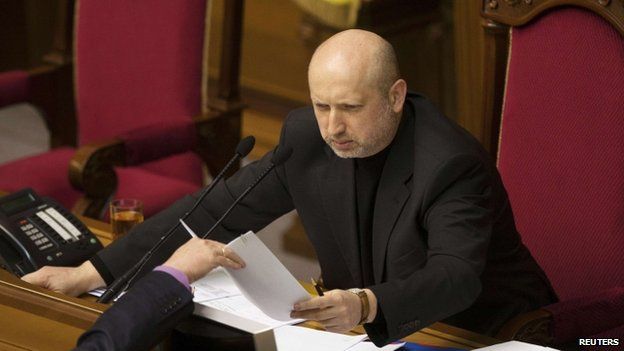Profile: Olexander Turchynov
- Published

Ukraine's new interim President, Olexander Turchynov, is considered the right-hand man of Yulia Tymoshenko, the former prime minister imprisoned by President Viktor Yanukovych.
He is the first deputy leader of her Fatherland party, and his political career is closely intertwined with hers. Their co-operation stretches back to the mid-1990s.
Their ties are so close that some pro-democracy activists may well worry that his rise could prepare the way for the newly released Ms Tymoshenko's return to the top.
While the former prime minister's 2011 conviction for abuse of power is seen by many as politically motivated revenge by her arch-rival Viktor Yanukovych, some regard her part of the same corrupt and discredited political and economic elite as the toppled president.
Mr Turchynov has played a key - if not publicly very prominent - role in the protests against Mr Yanukovych since they started in November. In February, prosecutors placed him under investigation for his activities in organising the protesters' "self-defence forces".
Following the collapse of President Yanukovych's government, Ukraine's parliament named Mr Turchynov as speaker and interim prime minister, and then - after voting to depose Mr Yanukovych - as interim president.
But like all of the mainstream opposition politicians, Mr Turchynov is not entirely trusted or respected by the protesters in Kiev's Independence Square.
He angered some of them when, after President Yanukovych's departure from Kiev on Saturday, he told them that they had achieved their goals and should now go home.
He is also seen as lacking charisma. Standing for mayor of Kiev in 2008, he failed to connect with voters and lost badly, despite strong support from Ms Tymoshenko - the then prime minister - and an unpopular incumbent.
Novelist
Unusually for traditionally Orthodox and Catholic Ukraine, Mr Turchynov is a Baptist. He is a pastor of Kiev's Baptist Church.
He is also a prolific writer of novels that deal with themes of corruption, the black economy and totalitarianism.
His 2005 book Illusion of Fear - a psychological thriller peppered with quotations from the Bible and illustrated with Hieronymus Bosch paintings - was made into a film and submitted as the country's entry for the Academy Award for the best foreign language film in 2008.
Like Ms Tymoshenko, Mr Turchynov is a native of the industrial city of Dnipropetrovsk, in the mainly Russian-speaking east of the country.
Born in 1964, he studied metallurgy, and first became involved in politics as a member of Komsomol - the youth organisation of the Soviet Communist Party.
In the period, he joined the Democratic Platform - a tendency in the party that sought democratic reform and heralded the Soviet Union's first tentative moves towards political pluralism.
He went on to head one of Ukraine's first independent news agencies, and - shortly before the collapse of the Soviet Union - founded a political think-tank.
In 1993, he became economics aide to then Prime Minister - later President - Leonid Kuchma in 1993, and later that year co-founded the centre-left Hromada Party, together with Pavlo Lazarenko.
They were soon joined by Ms Tymoshenko, then one of Ukraine's newly immensely rich oligarchs who was seeking to expand her influence into politics. Mr Turchynov was first elected to parliament in 1998.
But Hromada collapsed when Mr Lazarenko fled to the United States in 1999 after an investigation began into claims that huge sums of money had been embezzled when he was prime minister in 1996-7.
Security agency chief
Ms Tymoshenko and Mr Turchynov then founded the Fatherland Party, which gradually became one of the main components of the opposition to President Leonid Kuchma and then his chosen successor, Viktor Yanukovych.
In the 2004 presidential election, Mr Turchynov helped run the campaign of opposition leader Viktor Yushchenko, whose subsequent loss to Viktor Yanukovych amid allegations of mass fraud triggered post-Soviet Ukraine's first - Orange - revolution.
After the 2004 protests swept Mr Yushchenko and Yulia Tymoshenko into power as president and prime minister respectively, Mr Turchynov was appointed head of the SBU - Ukraine's domestic security agency in February 2005.
Charged with reforming the successor of the Soviet-era KGB along Western lines, he pledged to stop the practice of using it as a weapon against political opponents, end the illegal wiretapping of phones and revive the population's trust in the agency.
But he lost the job after he only seven months, when Mr Yushchenko and Ms Tymoshenko spectacularly fell out and Ms Tymoshenko was sacked from the post of prime minister. He returned to government as deputy prime minister in Ms Tymoshenko's second government, which lasted from 2007 and 2010.
BBC Monitoring reports and analyses news from TV, radio, web and print media around the world. For more reports from BBC Monitoring, click here. You can follow BBC Monitoring on Twitter and Facebook.